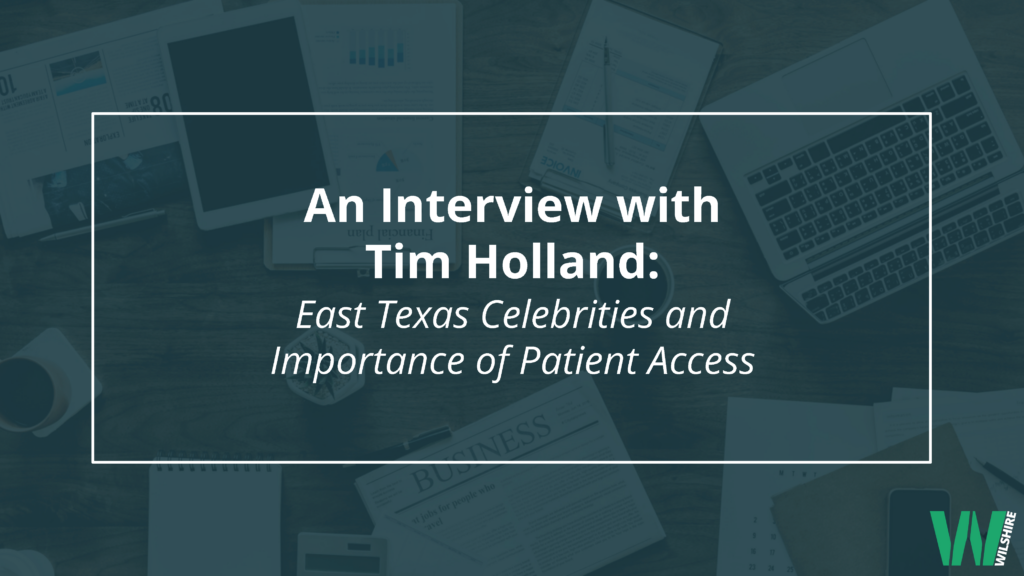For our blog this week I was joined for an interview by the newest member of our growing Patient Access team here at Wilshire, Tim Holland. I hope you enjoy learning a bit more about Tim, what he brings to the team, and where he sees Patient Access heading!

A little more on Tim’s background:
Tim Holland has 13 years of Revenue Cycle and Patient Access experience in various hospital operation roles and eight years of Epic front-line experience. Tim also recently completed a two-year term as a voting Board Member for The National Association of Healthcare Access Management (NAHAM), representing the nine states of the NAHAM Southwest Region.
Tell us a bit about yourself and why you chose Wilshire?
- Born and raised in East Texas. I call Lindale home, but was born in Tyler – about 10 miles south of Lindale. It is a great and quiet community.
- I spend a lot of time with family and I enjoy working outside, building things (Decks, barn doors, etc.). It’s a cool (but) expensive hobby to get into.
- I know a couple of the folks on the Wilshire team from other moments in my career. They had phenomenal things to say about this team. It was that and what I have perceived to be an excellent and knowledgeable team of Revenue Cycle professionals that made the decision for me. I wanted to be a part of this “Elite” group and was really honored to even be considered and recruited.
What in your former role, as a Patient Access Director, are you most proud of?
- Getting creative with Epic – We built a Wait Time Tracking process and dashboard, that was pretty cool.
- Employee Development –I LOVED helping other folks grow in their careers. That’s probably my most favorite thing about my time in operations.
What did you and your team do to really improve your operations?
- Employee Retention: My first big win as a Director (around 2013) was improving retention in the Tyler Admissions Department. When I took over, retention was somewhere in the 50% range. It was extremely difficult to keep anyone long enough to effectively train them and it always felt like the team was barely staying above water. Within a year, we had retention up to 83%. It took a number of things to get there – market/merit reviews, incentive policies, communication, just to name a few….but it worked. And when I left in 2020, we had not slipped below 82% from 2013 – 2020. I’m very proud of that.
- Training and Growth: Once retention became less of an issue, we turned our focus to training and departmental growth. We began focusing on improving POS Collections (to where we consistently stayed between 2.5 and 3% of Net Patient Revenue), understanding insurance plans (and helping patients clearly understand insurance!), decreasing denials, just to name a few. But none of that would have improved like it did if we didn’t focus on the people first.
How did you enable Epic to support your operations? How did you work with your IT folks?
- Build relationships: I got to be really good friends (and still am) with the IT Manager pretty quickly – to where we went to lunch almost once a week. That helped. And I really did that with a lot of the IT/Epic folks. They weren’t just a supporting department to me…. they were people and I built some great relationships with a good number of them. We got to where we really admired respected one another. That made it very easy to work with everyone and I was able to get what I needed.
- Come to the Table with Purpose and Plan: That being said – I had to make sure I had at least the beginnings of a plan when I shared my idea. That cut down on the amount of time we needed to really talk out and build what Revenue Cycle was thinking.
Patient Access is one of the most vital and quickly evolving areas of healthcare operations, where do you see things heading into 2021 and beyond?
- The Theme: Keep and expand on the efficiencies and innovations you gained while adjusting your operations to meet the needs of the ongoing pandemic.
- Remote work force
- As bad as COVID-19 is, it has forced a lot of professions to think much more creatively – and that I find to be exciting. We’ve had “remote” capability/technology for literally years now, but very few organizations ever thought to move to that type of a model. Strictly from an Access perspective, the efficiencies that could be gained, and money saved, by moving to an at least partial remote strategy are huge! Without even getting into how much of a benefit this is from the associate’s perspective (i.e. work from home, increased productivity, etc.), if you just look at what organizations could do with the dollars saved on real-estate expenses, energy costs, maintenance, and other general overhead items, it should be a no-brainer. There are gigantic cost savings and ROI potentials there. It is those reasons I think remote workforces are only going to grow even more over time. To me, the NEW challenge becomes less of if we trust the associate to productively work from home and more about how we convince the folks that need to be on site to come to work.
- Telemedicine
- I was just as impressed with how quickly these big health care systems shifted to a telemedicine platform as I was with the “forced” shift to a remote workforce. And I think that this shift has opened a lot of eyes and telemedicine will only grow over time. The big question to me is how are insurance companies going to reimburse for it? They’re paying right now but that’s because of COVID and there aren’t really any solid/long term commitments coming from the big payers yet. If insurance companies decide to continue paying for tele-visits, I think you’re going to see a huge boom in technology and software development to accommodate this need. That changes the way Access looks a bit – especially in Clinics. For those organizations that really go after tele-health, you could see a dip in in-person visits. Assuming that that “dip” is the new normal, there might be more of a need for a specialized Access individual rather than entry-level Access associates. Someone who can perform all necessary Access functions (when needed), but is also a Financial Counselor/Advocate and can help patients in more ways than just “checking them in” because there’s potentially more available time to spend with patients. In-person visits will never go away, but the way we Access folks interact with patients will change because of Telemedicine. In my opinion, for the better.
- Agile, Scalable Operations
- This was a tough one for me (in my Ops role) at the start of this Pandemic. Like most hospitals, we shut down almost all outpatient/non-essential services for about two months in March/April. That shut down affected about 70% of my workforce and it was extremely difficult to make sure I didn’t lose anyone to furloughs or lay-offs. I’m very proud to say we were successful and didn’t lose a single associate. We were able to accomplish that because of how flexible we became with our day-to-day duties. I placed team members in screener roles, created follow-up queues to contact our discharged ER patients (for demographic accuracy and POS Collection attempts), pushed outpatient associates into ER support roles to help with volumes, and had a number of other creative ideas to prevent lay offs. Not all associates were able to get 100% of their hours, but they still had jobs.
- The ER phone queue support was probably my favorite solution. As a precaution, any patient that presented to our ER’s weren’t registered by an “in-person” associate. Instead, patients were called on their room phone where we captured consent, demographic updates, etc. POS collections dropped a little, but because we were able to communicate with these patients, we did prevent them from drying up altogether with this process.
- Streamlined patient arrival processes, keep them as touchless as possible
- Platforms like MyChart are awesome. The fact that we can push consents to MyChart, pay bills, etc. is really a tremendous technology gain, but it will change how Access folks are perceived, permanently. I would strongly encourage Access leaders to embrace this change and work toward creating more of a specialized “niche” role for Access folks. As patients begin to shop for healthcare services, much like they would shop for a car, the most successful health care organizations will be the ones that recruit and retain associates that can effectively communicate insurance and financial responsibility in a customer-centric way. To expand on “Customer-centric” a little, to me, it means more than just being someone that has great communication and customer service skills (obviously a must, but no longer enough). It will start to include things like being able to effectively communicate with patients via chat (MyChart Messenger), becoming more computer literate and not necessarily working with patients face-to-face, but through e-documents that are both patient access facing (consents/patient rights) and customer service facing (Estimates, EOB’s, Financial Assistance, etc.).
- Increased price transparency and improved patient collections
- Economic issues can make POS Collections more challenging in today’s environment. Estimates are a must. A hospital that operates without some type of estimate process will have a hard time surviving. In addition to estimates, providing some type of motivation/incentive for Access users needs to be a must. An Incentive program’s (specifically a financially based incentive program) ROI is very apparent: increased associate satisfaction and retention, improved patient relations, increased POS Collections, decreased bad debt, just to name a few.
I hope that gives you an introduction to Tim, and an insider’s perspective on Patient Access in 2021. If anything caught your attention, and you’d like to continue the conversation, send an e-mail to Tim Holland at t.holland@thewilshiregroup.net or f.jenkins@thewilshiregroup.net.
